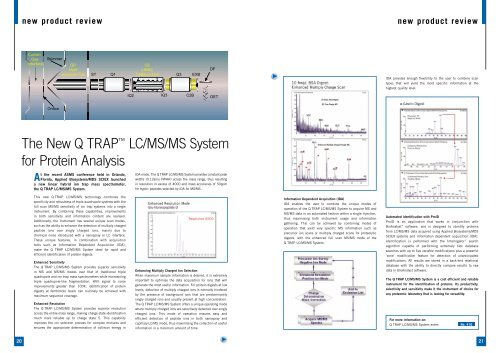Issue 4 Summer 2002 - Applied Biosystems
Issue 4 Summer 2002 - Applied Biosystems
Issue 4 Summer 2002 - Applied Biosystems
You also want an ePaper? Increase the reach of your titles
YUMPU automatically turns print PDFs into web optimized ePapers that Google loves.
20<br />
new product review<br />
Curtain<br />
Gas<br />
Interface<br />
The New Q TRAP LC/MS/MS System<br />
for Protein Analysis<br />
A<br />
Skimmer<br />
Orifice<br />
Q0<br />
High-<br />
pressure Cell ST Q1<br />
t the recent ASMS conference held in Orlando,<br />
Florida, <strong>Applied</strong> <strong>Biosystems</strong>/MDS SCIEX launched<br />
a new linear hybrid ion trap mass spectrometer,<br />
the Q TRAP LC/MS/MS System.<br />
This new Q TRAP LC/MS/MS technology combines the<br />
specificity and robustness of triple quadrupole systems with the<br />
full scan MS/MS sensitivity of ion trap systems into a single<br />
instrument. By combining these capabilities, improvements<br />
in both sensitivity and information content are realised.<br />
Additionally, the instrument has several unique scan modes,<br />
such as the ability to enhance the detection of multiply charged<br />
peptide ions over singly charged ions, mainly due to<br />
chemical noise introduced with a nanospray or LC interface.<br />
These unique features, in combination with acquisition<br />
tools such as Information Dependant Acquisition (IDA),<br />
make the Q TRAP LC/MS/MS System ideal for rapid and<br />
efficient identification of protein digests.<br />
Enhanced Sensitivity<br />
The Q TRAP LC/MS/MS System provides superior sensitivity<br />
in MS and MS/MS modes over that of traditional triple<br />
quadrupole and ion trap mass spectrometers while maintaining<br />
triple quadrupole-like fragmentation. With signal to noise<br />
improvements greater than 100X, identification of protein<br />
digests at femtomole levels can routinely be achieved with<br />
maximum sequence coverage.<br />
Enhanced Resolution<br />
The Q TRAP LC/MS/MS System provides superior resolution<br />
across the entire mass range, making charge state identification<br />
much more reliable up to charge state 5. This capability<br />
improves the ion selection process for complex mixtures and<br />
ensures the appropriate determination of collision energy in<br />
Q2<br />
LINAC<br />
Collision Cell<br />
IQ2 IQ3<br />
Q3 EXB<br />
C2B<br />
DF<br />
DET<br />
IDA mode. The Q TRAP LC/MS/MS System provides constant peak<br />
widths (0.12amu FWHH) across the mass range, thus resulting<br />
in resolution in excess of 4000 and mass accuracies of 50ppm<br />
for tryptic peptides selected by IDA for MS/MS.<br />
Enhancing Multiply Charged Ion Selection<br />
When maximum sample information is desired, it is extremely<br />
important to optimise the data acquisition for ions that will<br />
generate the most useful information. For protein digests at low<br />
levels, detection of multiply charged ions is normally hindered<br />
by the presence of background ions that are predominantly<br />
singly charged ions and usually present at high concentration.<br />
The Q TRAP LC/MS/MS System offers a unique operating mode<br />
where multiply charged ions are selectively detected over singly<br />
charged ions. This mode of operation ensures easy and<br />
efficient detection of peptide ions in both nanospray and<br />
capillary LC/MS mode, thus maximising the collection of useful<br />
information in a minimum amount of time.<br />
Information Dependent Acquisition (IDA)<br />
IDA enables the user to combine the unique modes of<br />
operation of the Q TRAP LC/MS/MS System to acquire MS and<br />
MS/MS data in an automated fashion within a single injection,<br />
thus maximising both instrument usage and information<br />
gathering. This can be achieved by combining modes of<br />
operation that yield very specific MS information such as<br />
precursor ion scans or multiply charged scans for proteolytic<br />
digests, with the enhanced full scan MS/MS mode of the<br />
Q TRAP LC/MS/MS System.<br />
new product review<br />
IDA provides enough flexibility to the user to combine scan<br />
types that will yield the most specific information at the<br />
highest quality level.<br />
Automated identification with ProID<br />
ProID is an application that works in conjunction with<br />
BioAnalyst software, and is designed to identify proteins<br />
from LC/MS/MS data acquired using <strong>Applied</strong> <strong>Biosystems</strong>/MDS<br />
SCIEX systems and information dependent acquisition (IDA).<br />
Identification is performed with the Interrogator search<br />
algorithm capable of performing extremely fast database<br />
searches with up to five variable modifications plus a powerful<br />
‘zone’ modification feature for detection of unanticipated<br />
modifications. All results are stored in a back-end relational<br />
database with the ability to directly compare results to raw<br />
data in BioAnalyst software.<br />
The Q TRAP LC/MS/MS System is a cost efficient and reliable<br />
instrument for the identification of proteins. Its productivity,<br />
selectivity and sensitivity make it the instrument of choice for<br />
any proteomic laboratory that is looking for versatility.<br />
For more information on:<br />
Q TRAP LC/MS/MS System enter: No. 416<br />
21


